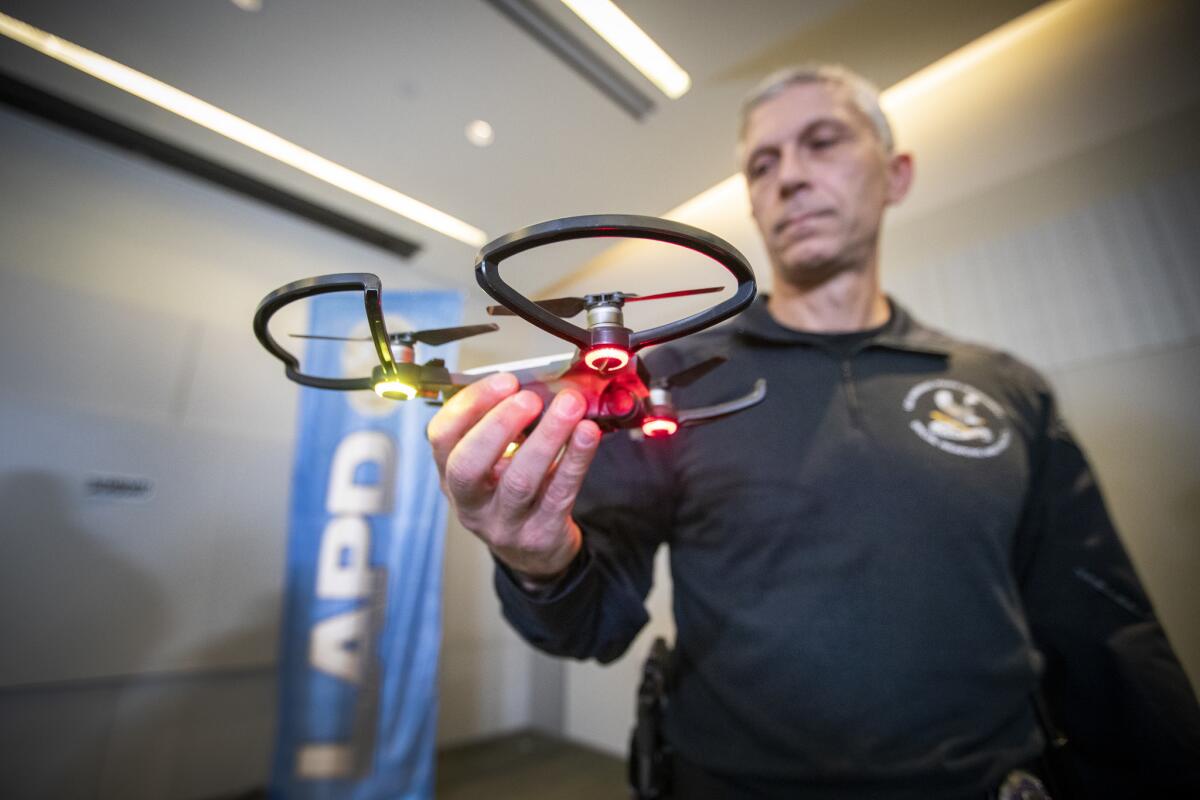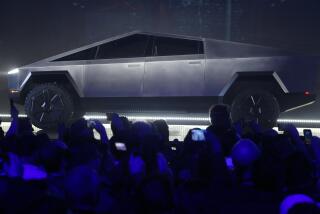Drones are now a permanent part of the LAPD’s arsenal

Drones became a permanent part of the Los Angeles Police Department’s crime-fighting arsenal Tuesday, despite opposition from privacy advocates who fear the remote-controlled aircraft will be used to spy on people.
In a yearlong trial, the LAPD’s SWAT team deployed drones four times, mostly when suspects were barricaded and the device provided a bird’s eye view of the property’s nooks and crannies.
On Tuesday, the five-member civilian Police Commission unanimously approved new regulations that enshrine the drones’ use in specific situations, including active shooters, barricaded suspects and search warrants.
The drones will not be equipped with weapons or facial recognition software, according to the regulations, which are similar to those governing the trial program.
In July, at Chief Michel Moore’s recommendation, the use of drones was expanded beyond SWAT to include the bomb squad in neutralizing explosives and sweeping large public events for radioactive devices.
Drones “provide invaluable information to decision makers while decreasing the risk to human life,” Moore wrote in a July 3 report, noting that everyone is safer when the devices check out a dangerous situation instead of officers going in blind.
The LAPD joins about 600 other law enforcement agencies around the country that use drones, according to a 2018 report by Bard College’s Center For the Study of the Drone.
The new regulations will ensure that the drones are not “being used in a flippant manner,” Asst. Chief Horace Frank, who runs the department’s counter-terrorism and special operations bureau, told the Police Commission on Tuesday.
The LAPD’s drone regulations are more restrictive than those of many other agencies, Frank said. Each drone deployment must be approved by a commander and a deputy chief, and the Police Commission will receive an annual report.
Asked by Commissioner Eileen Decker whether drones can help de-escalate volatile situations, Frank cited a June 15 incident when a drone flew near a man who had barricaded himself in a trucking yard.
“The minute we deployed the device at the entrance to the trailer and he saw it, he gave up,” Frank said.
Activists said the LAPD and Police Commission have disregarded citizens who expressed reservations about the drones in community meetings and online surveys.
One activist, Michael Novick, predicted that the LAPD would expand drone usage and infringe on civil liberties.
“We’re witnessing the exact definition of mission creep,” Novick said. “Now you’re upgrading. You approved a temporary pilot project. You’re going to normalize it with this step. … The next step will be they’ll come back and say, ‘We actually need the ability to have facial recognition.’”
The LAPD’s drone fleet will remain at four strong, Frank said. But the DJI Spark devices used in the pilot program will be replaced by DJI Mavics, which have better indoor flying capabilities, extended flight time and lights for navigating in the dark. The models are similar to those used by hobbyists.
The Police Commission accepted a $6,645 donation from the Los Angeles Police Foundation to purchase the Mavics, as well as a donation of drone flight tracking software from Measure Aerial Intelligence.
As the commission approved the drone regulations and donations, the audience broke into chants of “Shame! Shame!”
Moore said he is mindful of “concerns of Big Brother and invasion of privacy and civil liberties.”
“We’re committed to striking the right balance that … protects all of our community — their rights of privacy but also their public safety and their right to exist without threats of dangers that this tool can be used in some instances to mitigate,” he told reporters after the meeting.
More to Read
Sign up for Essential California
The most important California stories and recommendations in your inbox every morning.
You may occasionally receive promotional content from the Los Angeles Times.











